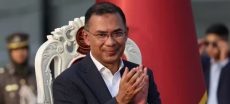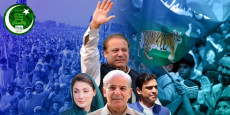[vc_row][vc_column][vc_column_text dp_text_size=”size-4″]As president, Xi Jinping has been granted an extraordinary third term, culminating a rise that has made him China’s most powerful figure in decades.
Xi raised his right fist and laid his left hand on a crimson leather copy of the Chinese constitution during an elaborate ceremony in Beijing.
He made a commitment to “create a wealthy, strong, democratic, civilised, harmonious, and glorious modern socialist country” in the oath, which was broadcast live on state television across the country.
The selection by China’s rubber-stamp parliament comes after he was given a further five years as head of the Chinese Communist party (CCP) and the military, the country’s two most important political institutions.
Since then, 69-year-old Xi has faced challenges including mass protests over his zero-Covid policy and its subsequent abandonment that saw countless people die.
These topics were ignored at this week’s National People’s Congress (NPC), a carefully watched gathering that will also name Xi loyalist Li Qiang as the new premier over the next two days, placing him in charge of overseeing the second-largest economy in the world.
In response to what one NPC deputy described as foreign attempts at “containment and suppression” of the country’s progress, the lawmakers have instead concentrated on a comprehensive overhaul of Beijing’s science ministry and technological capabilities.
Read More: In Germany, a shooting at a Jehovah & Witness church left several people dead.
The body on Friday passed reforms to government institutions unveiled earlier this week, including a sweeping overhaul of the country’s science and technology ministry in the face of what one NPC deputy described as foreign attempts at “containment and suppression” of the country’s rise. New reforms also included the formation of a financial regulatory body and national data bureau.
The beginning of China’s new political term also saw former vice premier Han Zheng elected as its new vice-president and Zhao Leji, former chief of the party’s top anti-corruption commission, as the new parliamentary chair. Both are members of China’s highest political decision-making body, the Politburo Standing Committee. The election process, carried out at the Great Hall of the People at Beijing’s Tiananmen Square, lasted around an hour.
Beijing also disclosed a growth target of “about 5%” during the parliamentary conference, one of its lowest in decades, as well as a slight rise in defence spending.
The result of Xi’s astonishing climb from a relatively unknown party apparatchik to the head of an international superpower is his reelection.
Since Mao Zedong’s totalitarian dictatorship and cult of personality left their mark on China, the country has shunned one-man rule in favour of a more consensus-based, though nonetheless autocratic, form of government.
In accordance with that model, the presidency’s mostly ceremonial duties were subject to term restrictions; Jiang Zemin and Hu Jintao, Xi’s predecessors, left office after serving 10 years.
Term restrictions will be eliminated in 2018 under Xi’s tearing up of the rulebook.
His coronation this week sets him up to become modern China’s longest-serving head of state, and will mean Xi will rule well into his seventies and – if no challenger emerges – even longer.
But the beginning of his unprecedented third term leading China comes as the world’s second-largest economy faces major headwinds, from slowing growth and a troubled real estate sector to a declining birthrate.
Relations with the United States are also at a low not seen in decades, with the powers sparring over everything from human rights to trade and technology.
In a speech to delegates at the Chinese People’s Political Consultative Conference (CPPCC), which runs alongside the NPC this week, Xi criticised Washington’s “containment, encirclement and suppression of China”.
China, he said, must “have the courage to fight as the country faces profound and complex changes in both the domestic and international landscape”.
Prior to the conclusion of the annual legislative session, Xi will deliver a speech. China is now dealing with a number of issues, including an economy that has been hampered for three years by Covid restrictions and deteriorating relations with the West.[/vc_column_text][/vc_column][/vc_row]











